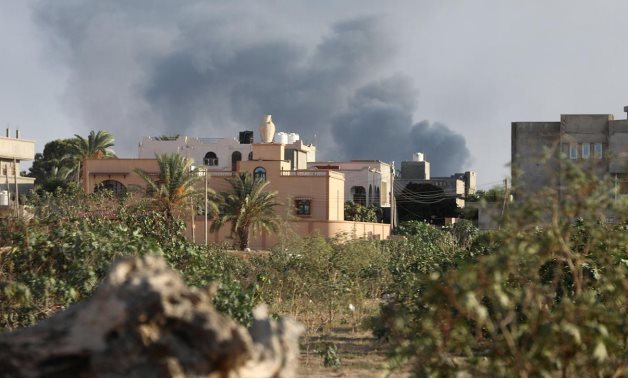
Smoke rises during heavy clashes between rival factions in Tripoli, Libya, August 28, 2018. Picture taken August 28, 2018. REUTERS/Hani Amara
CAIRO -4 November 2020: Qatar, Turkey, and some agents inside Libya aim to exacerbate the situation in the country; whenever a glimmer of hope looms on the horizon to achieve a political solution for the country, something happens toobstructthe permanent ceasefire agreement.
In light of the talks that are being held for the first time on Libyan soil in the city of Ghadames, some Libyan figures have rejectedthe ceasefire agreement, such as Libya's Grand MuftiAl-Sadiq al-Ghariani, who has been blacklisted as a terrorist, and others.
Ghadames hosts the fifth round of the joint military committee talks under the auspices of the United Nations for a period of two days to discuss mechanisms to stabilize the ceasefire in Libya.
The Ghadames meeting, which is held from November 2-4, will deal with several files, on top of which is the discussion of mechanisms for implementing the permanent ceasefire agreement signed in Geneva on October 23.
The Ghadames meeting comes days before the political dialogue talks in Tunisia, where the United Nations had invited 75 Libyan personalities to participate in the political dialogue, starting November 9.
But the calls for dialogue, whether in Libya or Tunisia, do not appeal to the isolated Libyan Mufti, al-Ghariani, who called for armed demonstrations against the Tripoli government headed by Fayez al-Sarraj.
Ghariani's statements regarding the call for armed protest appear to be a discordant call in order to obstruct the paths of dialogue that could lead to a Libyan political solution, amid strenuous international efforts to resolve the Libyan crisis.
Ghariani is not the sole beneficiary of the chaos in the country, as the commander of one of the militias in Tripoli, Salah Badie, who is on the UN Security Council sanctions list, announced his refusal to abide by the ceasefire agreement.
Badie did not hide his adherence to "war and weapons to address the Libyan crisis," which indicates violent acts may still occur in Libya.
Before Badie, the Supreme Council of State and the Minister of Defense in the Tripoli government came out with statements saying that the Geneva Agreement excludes security and military agreements that were signed with Turkey.
On the other hand, Doha embarked on signing a security agreement withSarraj's government, after the two parties reached a ceasefire agreement in Geneva, which stipulates the necessity to disband the militias.
All these moves come in conjunction with Sarraj announcing he will not be resigning due to calls to temporarily stay in his post.This revealed the truth about those who want a political solution, and those who are blocking the peaceful path inside and outside Libya.
On Tuesday, The United Nations Acting Envoy to Support Libya, Stephanie Williams, announced on Tuesday that the talks of the two delegations of the Libyan Joint Military Committee had made progress on implementing the terms of the ceasefire agreement.
"There is consensus and remarkable progress; it is very encouraging and important to transfer this sense of responsibility to the political class," the UN envoy said in a press conference held after the end of the inaugural session of the talks hosted by Ghadames.
Williams did not announce further details about the agreement. "In tomorrow's session, the details of implementing the terms of the agreement will be discussed," she added.
The UN envoy commended the efforts of the Military Commission. "Delegations have set an example of national responsibility, which is required of the participantsin the political dialogue in Tunisia," she stated.
On the reasons for choosing Ghadames to host these military talks, she replied that Ghadames was chosen by the delegations to conduct the meeting to discuss the details of implementing the terms of the ceasefire agreement.

Comments
Leave a Comment